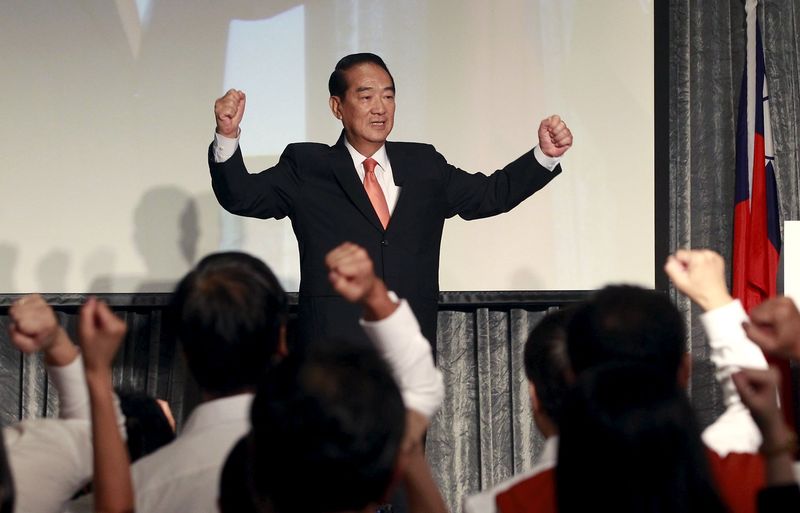By Ben Blanchard and J.R. Wu
BEIJING/TAIPEI (Reuters) - China's top policy maker on Taiwan warned the self-ruled island on Thursday it would soon have to choose between continuing the peaceful development of ties, or returning to the "evil ways" of independence, which would threaten the peace.
The harsh comments came as a 73-year-old Taiwan politician announced he would run for president in January, likely acting as a spoiler boosting the chances of an independence-leaning opposition Democratic Progressive Party (DPP) rival to win.
The entry of James Soong, chairman of the Taiwan's People First Party, could make the task of retaining power harder for the ruling Nationalist Party, which is unpopular over a perceived creeping dependence on China.
Soong, a once powerful Nationalist politician, is expected to split the ruling party's votes, paving the way for front runner and DPP presidential hopeful Tsai Ing-wen to win.
The Nationalists are expected to be thrashed by the DPP in the poll, a result likely to upset China, which claims Taiwan as its own and has never renounced the use of force to bring the island under Beijing's control.
Zhang Zhijun, head of China's Taiwan Affairs Office, told a forum on China-Taiwan relations that Taiwan was at a crucial point, facing profound societal changes, endless political disputes and frequent "interference" in ties with China.
"Will cross-Taiwan Strait relations continue to advance on the road of peaceful development, so people can enjoy the peace dividend? ... Or will it turn back, turning its back on history and returning to the evil ways of Taiwan independence?" Zhang said, in a transcript released by the Chinese government.
The DPP, which has traditionally favoured Taiwan's formal independence, says it believes only the island's people can decide its future. Beijing takes this to mean it wants independence.
The first, and so far only, DPP president, Chen Shui-bian, infuriated Beijing during his term from 2000 to 2008.
China accused him of trying to push for independence, even though Chen tried to maintain stable ties.
"It must be seen that the forces of Taiwan independence are obstinately and resolutely promoting their separatist position, and this is the biggest threat to the peace and stability of the Taiwan Strait," Zhang said, adding that China's determination to protect its territorial integrity would "never waver".
Nationalist forces retreated to Taiwan in 1949 after a civil war with the Communists.
Relations improved after the Nationalist Ma Ying-jeou became president in 2008. China and Taiwan have since signed a series of landmark trade and economic deals.

Ma steps down next year because of term limits.